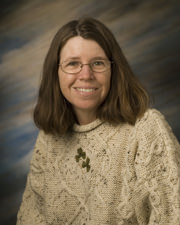Mary Wirth - W. Brooks Fortune Professor of Chemistry
Mary Wirth’s union with Purdue has come full circle, joining the College of Science faculty as the W. Brooks Fortune Professor of Chemistry. She returns to Indiana from the University of Arizona in Tucson. Her new lab, located on the fourth floor of the Brown Laboratory of Chemistry, includes space she occupied as a graduate student in the 1970s.
She is excited to be back at Purdue to build further on her research and take it in new directions. Wirth is excited not only to have returned to her alma mater but also to have joined what she views as one of the pacesetters in her discipline. “Purdue is one of the leaders in analytical chemistry. The people here have great vision,” she says. “Purdue isn’t just a follower in the field – it defines the trends.”
Biomarker Research
Professor Wirth’s research is centered on novel separation approaches for biological molecules, such as proteins. She’s an expert in the area of separations and optical spectroscopy, interfacing chemistry and medicine to create technology for earlier detection of diseases, such as cancer and infectious diseases. The research focuses on using silica nanoparticles for a wide range of tools used for biomarker discovery and medical tests.
Many of the particles she deals with in her research are less than 1/100 the diameter of a human hair. “If we could identify signs of cancer and infectious diseases through a blood test, treatment could begin long before symptoms become apparent, when diseases are much more easily treatable,” Wirth says. “The information is there in your blood, but the problem is that the early biomarkers have not been identified by researchers.” The most well-known test of this type is the prostate-specific antigen (PAS) test, which is used to detect prostate cancer before symptoms appear. The test measures the level of PSA – a biomarker or tumor marker – in the blood through a simple blood test.
bioVidria Inc.
Professor Wirth has translated her research into a company, bioVidria Inc., which is located in the Arizona Center for Innovation in Tucson. The company which she oversees as president, uses silica colloidal crystals as a platform technology for a suite of products fast biological analysis, with microarray substrates as the first product line. The manufacturing facility and business office of bioVidria will remain in Tucson, but research and development activities likely will be conducted in West Lafayette.
Childhood interest in science
Mary Wirth has always been curious about science. During childhood in Illinois, she played with her father’s telescope and collected fossils. She found every branch of science fascinating. “I really loved fossils, and I wanted to know more about rocks and soon discovered that chemistry could help me find some of the answers,” she says.
Wirth’s family encouraged her interest in science, but, in those days the barriers were high for women wanting to study the field. “My high school principal blocked me from taking fourth-year math, so I left high school and went to college a year early,” she says. Despite the early barriers, Wirth never lost her passion for science. She went on to earn a bachelor’s degree from Northern Illinois University in 1974 and a doctorate from Purdue in 1978, both in chemistry.
Source:
Purdue Marketing & Media, Kim Medaris Delker
Source:
Purdue Marketing & Media, Kim Medaris Delker

Mary Wirth
Professor, Analytical Chemistry